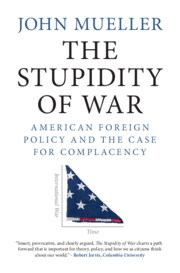'Smart, provocative, and clearly argued, The Stupidity of War charts a path forward that is important for theory, policy, and how we as citizens think about our world.'
Robert Jervis
Source: Columbia University
'Unfailingly incisive, witty, original, prescient, and constructively contrarian. True to form, this case for complacency will shake you out of your complacency on American military policy.'
Steven Pinker
Source: Harvard University
'John Mueller is incapable of writing a boring sentence. a thought-provoking, brilliant, funny and iconoclastic work. It would be very difficult for even the most hardened foreign policy professionals to read it and come away with their basic assumptions intact.'
Christopher Fettweis
Source: Tulane University
'Mueller makes a convincing case that our rivals are far less formidable that we imagine – and that, in fact, the 21st century has brought a worldwide understanding of the folly of war that should reshape how governments and citizens think about national security.'
Stephen Chapman
Source: Chicago Tribune
'Mueller challenges and dazzles with his acute vision and acid assessment of conventional national security wisdom. He documents a history of US post-world War II threat inflation, gives US wars a failing grade, and questions most authority. All the while weaving in movie, musical, and literary references.'
Neta C. Crawford
Source: Boston University
'John Mueller has launched a characteristically bold and sweeping assault on the key tenets of American national security policy. Even readers who do not agree will be challenged by a well-crafted and thoroughly documented argument.'
Martha Crenshaw
Source: Stanford University and Wesleyan University
'John Mueller once again unsheathes his pen to puncture the Washington threat consensus.'
Jacques E. C. Hymans
Source: University of Southern California
'In this book, John Mueller makes the bold argument that a culture of peace - not institutions, democracy, or American leadership - is the source of peace since World War II. He goes on to recite and refute historical examples of alarmist rhetoric about potential threats that proved to be exaggerated.'
Deborah Welch Larson
Source: University of California, Los Angeles
'Mueller’s account of a rising aversion to international war since 1945 provides a timely rejoinder to ominous predictions of war.'
Etel Solingen
Source: University of California Irvine
'[Mueller's] arguments are important and deserve a wide hearing, especially at the start of the Biden administration, when it feels as if the world is entering a new era and the future direction of U.S. foreign policy seems up for grabs. Books like Mueller’s should help inform the debate.'
Jonathan Tepperman
Source: Foreign Policy
'The Stupidity of War makes for bracing reading, and it will force readers from all foreign policy camps to reconsider what they think they know about the history of U.S. foreign policy.'
Daniel Larison
Source: Responsible Statecraft
'Powerfully argued [and] clearly written'.
Marvin Kalb
Source: The Washington Post
'Mueller is a provocative and original thinker … His latest book synthesizes decades of work and marshals reams of historical evidence to chronicle a litany of mistakes abroad - from the Vietnam War to the invasion of Iraq - that add up to an unflinching indictment of U.S. foreign policy since 1945.'
Tanisha M. Fazal
Source: Foreign Affairs
‘… Mueller has written a compelling and provocative book that challenges deeply held beliefs of many U.S. policy makers and international relations theorists. His book should be widely read by scholars and practitioners alike.’
Zachary C. Shirkey
Source: Critical Dialogue
‘analytic, witty, and highly readable.’
Michael J. Ard
Source: The Russell Kirk Center





